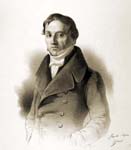Karl Ernst von Baer

Naturalist
Born: Piep, Duchy of Livonia (Piibe, Estonia) - 28 February 1792
Died: Dorpat, Duchy of Livonia (Tartu, Estonia) - 28 November 1876
One of the founders of the study of embryology, Karl Ernst von Bear was a German Baltic Knight who spent over thirty years at the Imperial Academy of Sciences in St. Petersburg, studying the natural world in a variety of disciplines.
Initially educated at the Imperial University of Dorpat (Tartu), Baer sought to expand his academic horizons with further studies in Berlin, Vienna and Wurzburg. He began his teaching career at the University of Konigsberg, where he served as a professor first of zoology and then of anatomy. It was in Konigsberg that he made his major discoveries in embryology, including the identification of an ovum in mammals (1829) and the formulation of Baer's laws of embryology, which amongst things proposed the controversial idea that species can be ranked according to the extent of neoteny. For these achievements, he was made a corresponding member of the Imperial Academy of Sciences.
In 1834 he moved to Saint Petersburg and started working at the Saint Petersburg Academy of Science, teaching zoology. Later he was appointed professor of comparative anatomy and physiology at the Medical and Surgical Academy. His wide-ranging interests included psychology, anatomy, ichthyology, ethnography, anthropology and geography.
While living in Russia, he took part in several expeditions in the Russian north, and was the first naturalist to visit the island Novaya Zemlya. During these trips he collected biological specimens and studied meteorology. He was one of the founding members of the Russian Geographical Society, and the founder and first president of the Russian Entomological Society.
He left St. Petersburg in 1867, and spent the last years of his life in Dorpat, where he was an active critic of Charles Darwin.

